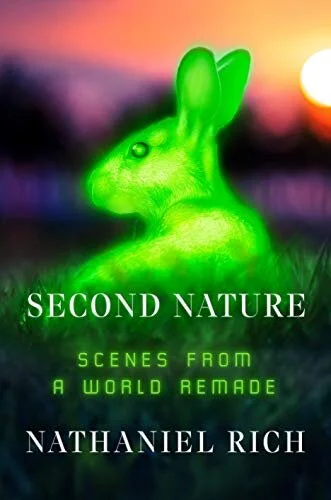Travel Documents 88: Second Nature
Genre: Near Future, Genetic Modification, Ecology, Climate Change, Political Science
The Dust Cover Copy
From the author of Losing Earth, a beautifully told exploration of our post-natural world that points the way to a new mode of ecological writing.
We live at a time in which scientists race to reanimate extinct beasts, our most essential ecosystems require monumental engineering projects to survive, chicken breasts grow in test tubes, and multinational corporations conspire to poison the blood of every living creature. No rock, leaf, or cubic foot of air on Earth has escaped humanity's clumsy signature. The old distinctions—between natural and artificial, dystopia and utopia, science fiction and science fact—have blurred, losing all meaning. We inhabit an uncanny landscape of our own creation.
In Second Nature, ordinary people make desperate efforts to preserve their humanity in a world that seems increasingly alien. Their stories—obsessive, intimate, and deeply reported—point the way to a new kind of environmental literature, in which dramatic narrative helps us to understand our place in a reality that resembles nothing human beings have known.
From Odds Against Tomorrow to Losing Earth to the film Dark Waters (adapted from the first chapter of this book), Nathaniel Rich’s stories have come to define the way we think of contemporary ecological narrative. In Second Nature, he asks what it means to live in an era of terrible responsibility. The question is no longer, How do we return to the world that we’ve lost?It is, What world do we want to create in its place?
The Scene
Worldbuilding
In this work, Rich covers and conveys the idea that we, the human race, must actively work to create a new kind of equilibrium in nature…given that we totally screwed the baseline, and there is no ‘normal’ to return to. Instead, we have to work together to create a new normal. He posits his case in ten solid topics that draw you in by acting, at first, as whodunits. What was causing a horrific smell and a strange illness in a suburb of Los Angeles? Why were sea stars pulling off their own limbs? What was killing animals and people in West Virginia?
As he moves through his sections, he gets more direct in facing the really thorny ethical issues, the ones with squick factor. And right beside him, you begin to question what we as humans have the ability, the right, and the duty to do and change. But you are also reminded that we have exactly that: abilities, rights, and perhaps most importantly, duties.
With clarity, compassion, and dry wit, Rich explains that we’re never going to put things back ‘the way they were’. But we might just make something uniquely and amazingly good, if we can get our priorities straight in time.
The Lingo
Writing Style
Written in an accessible, dryly humorous and witty voice, this book is a cynically delightful read, with occasional flashes of real and earnest hope. The author isn’t worried about whether you think he’s smart; he wants to make sure you’re listening. And trust me, you will be.
The Moves
Plot
Rich juxtposes the best of human against the most selfish and boneheaded, showing us both what heights we can reach and what depths we can sink to as we seek to make our version of A Good Life. He makes us ask who we’re making A Good Life for. When it’s just for ourselves, people wipe out the Passenger Pigeon and poison the community down the road. When it’s for people in our clique the rich get renewable towns like Aspen CO, and the poor get Cancer Alley. But when we want A Good Life for all beings? Then we start thinking in new and much more interesting ways. And it’s not always comfortable. Consider this: de-extinction. Bring back the Great Auk, the Passanger Pigeon, and the Tasmanian Tiger; creatures killed off by humans in recorded time. So, Rich asks us, what do you think? A good or a bad thing? The creations would not be the same creature, he clarifies. They would be a manmade version of the extinct bird, animal, or plant. And then he asks you, the reader: is that really such a bad thing?
How about geoforming tech? Given a bunch of examples, how does that make you feel?
Absolutely readable, the book doesn’t give you any easy answers. It doesn’t tell you how to feel. But it offers you a whole lot to start thinking over, and working on. Because we have got to start working on the mess we’ve made. That, he’s crystal-clear on.
Overall Rating
At turns infuriating, exciting, unnerving and delightful, this is nonfiction that reads like sci-fi. I highly recommend it.




